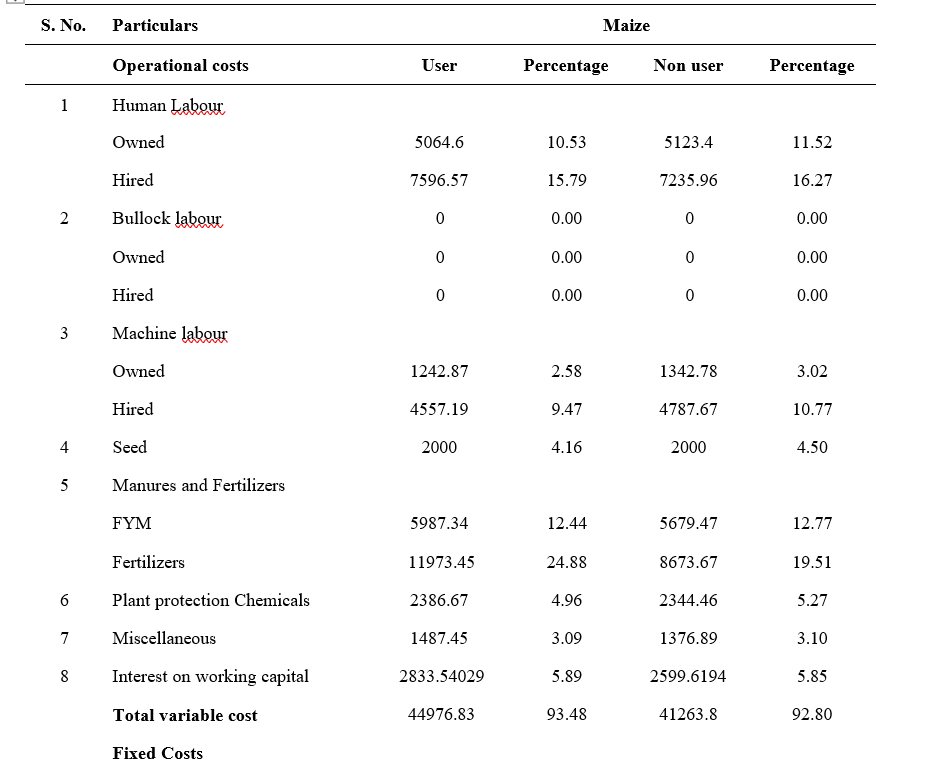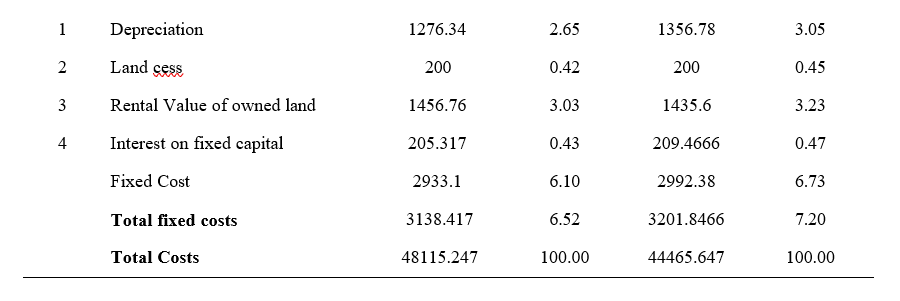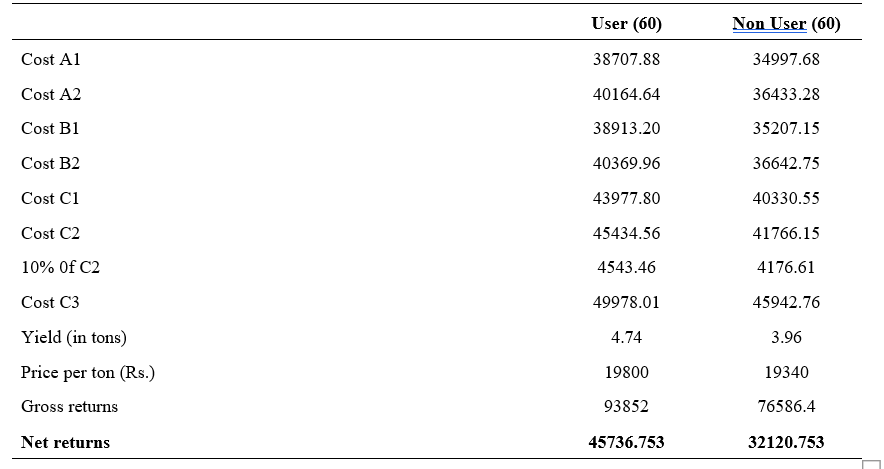Impact of Comprehensive Crop Nutrition Solution in Hybrid Maize Seed Production in Eluru District of Andhra Pradesh
0 Views
K. HEMANTH*, P. SUDHAKAR, MANTI VENKATRAMULU AND K. KIRAN PRAKASH
Institute of Agribusiness Management, S.V. Agricultural College, ANGRAU, Tirupati – 517 502.
ABSTRACT
This study explores the impact of Comprehensive Crop Nutrition Solutions (CCNS) on hybrid maize seed production in Eluru District, Andhra Pradesh, India. Maize plays a vital role in agriculture and food security, and its cultivation is crucial for farmers’ livelihoods and providing food to the population. The study evaluates the effectiveness of CCNS in enhancing crop yield, optimizing resource utilization, and addressing nutrient deficiencies prevalent in the region. Recent years have witnessed increased maize production in the region due to the adoption of high-yielding hybrids for commercial seed production. To further enhance productivity and address nutrient deficiencies prevalent in the region, the implementation of effective agricultural practices, including comprehensive plant nutrition solutions, is imperative. Through a survey, the awareness and acceptance of CCNS among farmers are assessed, highlighting the need for targeted awareness campaigns. Additionally, impact studied by cost and returns analysis revealed that the adoption of CCNS leads to improved productivity and profitability, making it a valuable tool for enhancing maize seed production in Andhra Pradesh.
KEYWORDS: CCNS, Impact, Hybrid maize, Seed production.
INTRODUCTION
Maize (Zea mays) is a vital cereal crop contributing significantly to global food security, livelihoods of farmers, and animal feed production. In India, maize cultivation covers approximately 2-3% of global maize production, with Andhra Pradesh being a major maize- producing state. Maize occupies a significant position in Indian agriculture, standing third in consumption after wheat and rice. Its cultivation covers over 6.17 lakh hectares in the country, with Andhra Pradesh contributing significantly to the production with 3.01 lakh hectares. The region’s favorable agricultural climate and increasing demand for hybrid maize seeds have led to notable growth in maize cultivation. Successful hybrid maize seed production requires more than just high-yielding hybrids it necessitates a well-implemented agricultural strategy focusing on nutrient management. The availability of nutrients in the right quantity and form is crucial for plant growth, soil fertility improvement, and maximizing crop productivity
Importance of Comprehensive Crop Nutrition Solutions (CCNS)
Comprehensive Crop Nutrition Solutions (CCNS) offer a holistic approach to nutrient management. These solutions encompass a wide range of nutrient sources, including inorganic, organic, and biological fertilizers, as well as compost teas and microbial inoculants. By
integrating these resources, CCNS optimizes nutrient cycling, minimizes external inputs, and maximizes input utilization efficiency. According to the Food and Agriculture Organization (FAO) of the United Nations, the Integrated Plant Nutrition System (IPNS) is an essential concept for adapting plant nutrition and soil fertility management to specific land characteristics. IPNS enables farmers to assess mineral nutrient availability and implement suitable nutrient management strategies for sustainable crop production and reduced environmental impact.
MATERIAL AND METHODS
The sampling procedure employed was stratified cum random sampling, with four mandals selected purposively based on the highest area under maize cultivation. A total of 60 hybrid maize cultivators using CCNS and 60 non-users were selected as respondents for the study. Data collection involved using a structured interview schedule to gather information on various socio-economic variables, including age, gender, education level, occupation, farming experience, annual income, and landholding. Rapport with respondents was established, and data was collected through personal interviews conducted in the local language, Telugu. For data analysis, simple tabular analysis, frequency and percentage calculation, mean and standard deviation computation, and partial budgeting technique were employed. The study analyzed cost concepts, income measures, interest on working capital, depreciation, rental value of owned land, and imputed costs, among others. The interviews will provide valuable insights into the farmers’ experiences, challenges faced in adopting comprehensive cop nutrition solutions, and the perceived impact of micronutrients on hybrid maize seed production.
RESULTS AND DISCUSSION
The results show that farmers’ awareness levels towards CCNS. Although a considerable proportion were familiar with the product, The findings revealed that a majority of farmers were middle-aged, male, and had completed primary education. The study indicated that middle-aged farmers dominated the sample, followed by older and younger farmers. Additionally, male farmers were significantly more involved in farming activities. Regarding education, a substantial number of farmers had completed primary education, while a smaller percentage had higher qualifications. there were areas requiring further education, such as the solution’s impact on soil fertility and water use efficiency. However, most farmers recognized CCNS’s positive effects on crop yield, reduction of manual labour, and improved grain weight.
To evaluate the impact of comprehensive crop nutrition solutions, a cost concepts analysis were conducted. This analysis considers the expenses incurred by farmers in acquiring and utilizing micronutrients and comprehensive crop nutrition solutions, juxtaposed with the resulting increase in hybrid maize seed yield and quality. The assessment will help determine the economic viability and sustainability of adopting these practices. The study anticipates that farmers with higher awareness and usage of comprehensive crop nutrition solutions, including micronutrients, will exhibit improved hybrid maize seed production metrics, such as increased yield, enhanced seed quality, and greater resistance to pests and diseases. Furthermore, the cost-comparison analysis is expected to reveal the economic advantages of adopting such practices, thereby encouraging more farmers to embrace comprehensive crop nutrition solutions. From the results of Table 1, The comparison of cost of cultivation between users and non-users of CCNS for maize cultivation is as follows: The total variable cost for CCNS users is Rs. 44,976.83, accounting for 93.48% of their total costs. In contrast, nonusers incur a total variable cost of Rs. 41,263.80, constituting 92.80% of their total costs. CCNS users incurred higher variable costs compared to non-users. The total fixed cost for CCNS users is Rs. 2,933.10, representing 6.10% of their total costs. On the other hand, non-users have a total fixed cost of Rs. 2,992.38, comprising 6.73% of their total costs. The fixed costs remain relatively consistent between users and non-users. Overall Total Cost: The overall total cost of cultivation for CCNS users amounts to Rs. 48,115.25, while non-users incurred Rs. 44,465.65. CCNS users incurred slightly higher total costs compared to non-users. In conclusion, the cost of cultivation for maize is marginally higher for CCNS users compared to non-users. However, further analysis and examination of the yield and other benefits of CCNS adoption are necessary to assess the economic viability and profitability of its usage in maize cultivation. The analysis of cost and returns for users and non-users of CCNS (60 each) reveals that users incur slightly higher costs in all categories (A1, A2, B1, B2, C1, C2, 10% of C2, and C3) compared to non-users. However, users achieve significantly higher gross returns (Rs. 93,852) than non-users (Rs. 76,586.4), resulting in higher net returns for users (Rs. 45,736.753) compared to non-users (Rs. 32,120.753) the study compared the cost of cultivation between users and nonusers of CCNS. Although users incurred slightly higher costs, they achieved higher crop yields, resulting in better gross and net returns compared to non-users. These findings underscored the benefits of adopting CCNS, as it positively impacted crop productivity and profitability.
From Table 2, it is analysed that the impact of agricultural intervention CCNS on users and non-users. Users experienced higher crop yield (4.74 tonnes), gross returns (Rs. 93,852), and net returns (Rs. 45,736.753) compared to non-users yield (3.96 tonnes). Despite slightly higher produce prices for users, the intervention proved to be profitable, indicating its effectiveness in enhancing maize productivity and income. The results emphasize the significance of adopting nutrient management practices for better agricultural outcomes.
The study showcases the significance of Comprehensive Crop Nutrition Solutions (CCNS) in boosting hybrid maize seed production in Andhra Pradesh. CCNS offers an integrated approach to nutrient management, optimizing resource utilization and improving crop yield and quality. The research highlights the need for promoting CCNS adoption through targeted awareness campaigns and educational programs. Farmers, policy makers, and agricultural professionals stand to benefit from the practical recommendations provided in this study. By embracing comprehensive plant nutrition solutions, farmers can enhance agricultural output, promote sustainable practices, and secure food security and economic stability in the region.
Table 1. Comparison of Cost of Cultivation Between Users and Nonusers of CCNS


Table 2. Cost and Returns of User and Nonuser of CCNS (Rs.)

LITERATURE CITED
Adjei-Nsiah, S., Agyei-Amponsah, G and Martey, E. 2018. Comparative Evaluation of Crop Nutrition Practices on Hybrid Maize Seed Production. African Journal of Agricultural Research. 13(30): 1572-1582.
El-Deeb M. 2020. Assessing farmer awareness of integrated crop nutrient management practices for maize production in the Nile River Delta, Egypt. Agronomy. 10(5): 704.
El-Mesmari, A., Almansouri, B and Abou Chehade, L. 2017. Impact of Different Crop Nutrition Strategies on Hybrid Maize Seed Production and Quality. Emirates Journal of Food and Agriculture. 29(8): 649-656.
Okalebo, J.R., Othieno, C.O and Ogutu, B. 2017. Effects of Different Crop Nutrition Programs on Hybrid Maize Seed Yield and Nutrient Uptake Efficiency. Journal of Soil Science and Environmental Management. 8(3): 33-44.
- Effect of Sowing Window on Nodulation, Yield and Post – Harvest Soil Nutrient Status Under Varied Crop Geometries in Short Duration Pigeonpea (Cajanus Cajan L.)
- Nanotechnology and Its Role in Seed Technology
- Challenges Faced by Agri Startups in Andhra Pradesh
- Constraints of Chcs as Perceived by Farmers in Kurnool District of Andhra Pradesh
- Growth, Yield Attributes and Yield of Fingermillet (Eleusine Coracana L. Gaertn.) as Influenced by Different Levels of Fertilizers and Liquid Biofertilizers
- Consumers’ Buying Behaviour Towards Organic Foods in Retail Outlets of Ananthapuramu City, Andhra Pradesh

